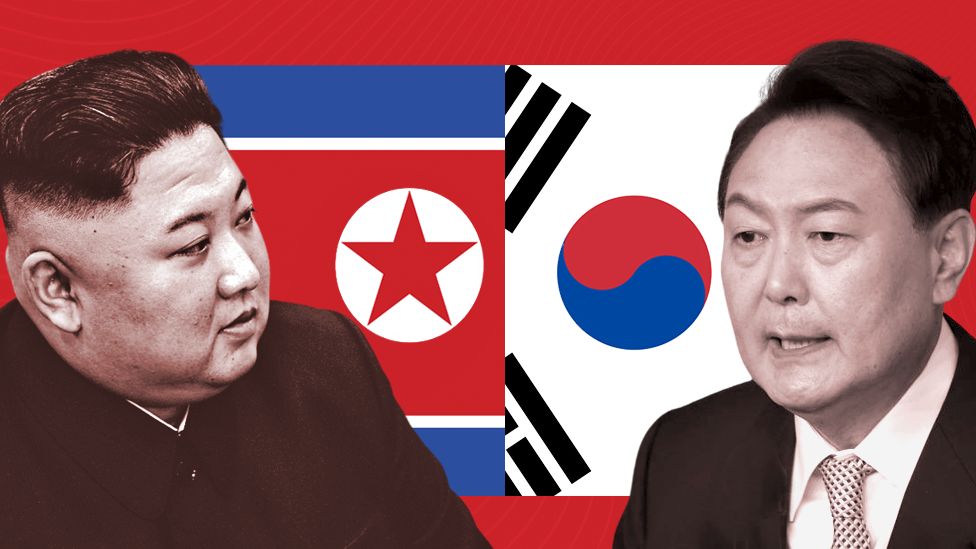From handshakes to hostilities: How dangerous is the situation in North Korea?

Kim Jong-un is testing North Korea's weapons with renewed urgency, as South Korea prepares to inaugurate a new, hard-line president. After years of stalemate, following failed nuclear talks, tensions on the Korean peninsula are rising.
(BBC) Kim Jong-un is testing North Korea's weapons with renewed urgency, as South Korea prepares to inaugurate a new, hard-line president. After years of stalemate, following failed nuclear talks, tensions on the Korean peninsula are rising.
"I thought about getting an axe, but I decided it would be too difficult to carry, so I settled for a knife."
Sitting in a dimly-lit cocktail bar, late one night, Jenn recounts her detailed escape plan. As a South Korean, living in Seoul, she knew exactly what she would do if the North attacked. First came the weapons, then two motorbikes: one for her, the other for her brother. Their parents would ride on the back. This way they could cross the city's river quickly, before the North Koreans bombed the bridges, and hopefully make it to the coast before the port was destroyed. One evening she and her brother sat and mapped their route, agreeing to tie ribbons to the trees should they be separated.
This was five years ago. At the time, North Korea was furiously testing missiles that could, in theory, deliver nuclear bombs to the United States, and its then President Donald Trump was threatening to respond with "fire and fury". Jenn admits she was more worried than most. But nonetheless, this was the closest many South Koreans felt they had come to war since fighting with North Korea ended almost 70 years ago.
Then something remarkable happened. South Korea's newly-elected president at the time, Moon Jae-in, convinced Mr Trump to meet Kim Jong-un. It was the first time a sitting US president had ever met the leader of North Korea. A flurry of historic summits followed, sparking hope that the North might just agree to give up its nuclear weapons, and the two Koreas would make peace. Excitement fizzed as President Moon, the son of North Korean refugees, arrived in the Capital Pyongyang and stepped out into a packed stadium, grasping the hand of his adversary. The audience didn't know what to do, recalls Prof Moon Chung-in, the president's advisor at the time. They had been told this man was their enemy, yet here he was on their soil, proposing peace. Suddenly, the 150,000 North Korean spectators erupted in raucous applause. "It was amazing to watch, it was a very moving moment for me," he says. But as President Moon leaves office, the hopes of that year lie in tatters. When a nuclear deal between the United States and North Korea collapsed in 2019, so did talks between the Koreas. There has been a stalemate ever since. Meanwhile North Korea has continued to develop its weapons of mass destruction and is once again testing them with alarming frequency. Only this time, the pandemic and now the war in Ukraine mean the eyes of the world have been focused elsewhere.
Asked if the government failed, Prof Moon Chung-in is defensive. "No, I don't think so! Was there war?" He reasons that for five years the Moon government kept the peace during one of the biggest crises in inter-Korean relations. It also showed what incentives would get North Korea to the negotiating table. The problem, he believes, is that North Korean negotiators returned empty-handed, in what was a great embarrassment for the regime, and almost certainly a punishable offence.
President Moon tried everything he could to coax the North Koreans back to talks, but in doing so he has been accused of appeasing one of the world's most brutal dictators.
"When I saw those pictures of them with their arms around each other laughing, it sent shivers down my back," remembers Hanna Song, from her office in downtown Seoul. Her organisation, the Database Centre for North Korean Human Rights, has been tracking human rights violations in North Korea for more than two decades. The last few years have not been easy.
Human rights are Kim Jong-un's Achilles' heel, Hanna explains. She says that in an effort to stop the North Korean leader from feeling uncomfortable, President Moon "swept them under the rug"
Hanna's organisation interviews North Korean escapees at Hanawon, the resettlement centre where they live for their first three months in the country. Their testimonies play a vital role in documenting human rights abuses. But two years ago, the South Korean government cut off their access to the centre, meaning they could no longer gather their evidence. Then Hanna started hearing from escapees that they were being pressured not to speak publicly about their experiences in North Korea. Some received calls from the local policemen assigned to help them assimilate. "Are you sure it's wise to be doing this?" they asked.
Hanna tried challenging the government over the missing information. "What are you going to do when there is this gap in evidence, just because you wanted to make sure Kim Jong-un wasn't being shamed in front of the international community?" she would ask, to little response.
"What's happening in Ukraine is horrendous," Hanna concludes, "but at least we know."
Frighteningly little is known about the current situation in North Korea. Its self-imposed coronavirus border closure has stopped people, and therefore information, from leaving. What is clear is that Kim Jong-un has continued developing nuclear weapons, in spite of numerous international sanctions designed to stop him from doing so. His weapons are becoming more sophisticated and dangerous. In March, the regime tested its first intercontinental ballistic missile for the first time since the summits of 2018 began, and it flew further and for longer than any of its previously tested missiles.